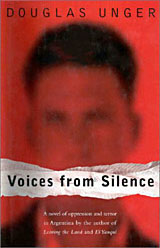
Government suppression, terrorism, and genocide have a heartbreaking universality. The locales and victimes may change, but the acts are similar, as are the aftershocks, the attempts to seek justice for these tragic acts.
Voices from Silence is about an Argentinian family as viewed by an American journalist, Diego, once an exchange-student friend of its three sons. He returns to Buenos Aires when the political trial concerning the “disappearance” of one of the sons, Miguel Benevento, is about to take place. Along with Miguel, another son, Alejo, had vanished during the 1970s when tens of thousands of such disappearances occurred. Diego sets about probing the truth of those years of terror.
For the grieving Papá and Mamá Benevento, everything they had truly cared about was taken from them with the loss of Miguel and Alejo. Worst of all, they are putting their own lives at risk as their quest for the public disclosure of political crimes uncovers the treachery of friends, neighbors, and perhaps their own family.
—(Jacket copy from the first edition)
Praise for Voices from Silence:
…This novel is set in an Argentina trying to acknowledge the “dirty war” of 1976-83. Unger’s emotionally complicated story is a grisly sequel to El Yanqui, which took place in a more benign period, before the country’s political passions went from the operatic to the truly terrifying.
—Thomas Mallon, The Washington Post Book World (year-end pick in the category of historical fiction).
…Unger’s writing is low-keyed yet taut; through Diego, he serves as witness and conscience, fashioning an eloquent testament against human-rights abuses.
—Publisher’s Weekly (starred review)
…Diego’s love for the brothers, mixed with the guilty fear that he may have influenced their politics (and the fact that his own brother is a Vietnam veteran living on the streets) gives Voices from Silence an emotional authenticity rarely found in American accounts of other nation’s tragedies.
—Willamette Week
…Mr. Unger’s Argentina is a place of multiple torments, many of them warring within individuals… Voices from Silence seems more in the greatest tradition of the 19th century novel, that powerful scourge of injustice as well as print’s most copious form of infotainment: filled with data and sensation and a realism that is magical all by itself.
—The New York Times Book Review
Read this story of los desapercidos of Argentina not as a memory but as a reminder. It is a lyrical warning of the ‘cycles of power and cruelty’ to anyone anywhere who has a conscience.
—Ana Castillo
The abuses of the last military regimes in Argentina are presented from the perspective of the human suffering of a real family, a profoundly touching experience.
—Edy Kaufman, Director of the Center for International Development and Conflict Management